



Choose Battles Wisely When Considering a Recombinant
“You have to look at the big picture and use recombinant vaccines strategically,” says Marilynn Finklin, DVM, poultry technical service manager for Merck Animal Health in Broiler Health.Recombinant vaccine technology has brought more convenience and safety to poultry health programmes. The only hitch: two recombinant vaccines made with the herpesvirus of turkey (rHVT) could interfere with each other if used in the same flock. Producers, therefore, need to choose their battles carefully and determine which disease problem warrants this superior technology.
|
* "Since poultry need protection against multiple diseases, you need to carefully determine which diseases are best controlled with a rHVT or with conventional live vaccines." |
Marilyn Finklin, DVM
|
“You have to look at the big picture and
use recombinant vaccines strategically,”
says Marilynn Finklin, DVM, poultry
technical service manager for Merck
Animal Health.
“Since poultry need protection against
multiple diseases, you need to carefully
determine which diseases are best
controlled with a rHVT or with
conventional live vaccines.”
The veterinarian pointed to a recent field
trial conducted with a US integrator to
illustrate her point.
Evaluating Options
The producer wanted to determine the
best vaccination programme for six-pound
broilers. The goal was to protect flocks
against infectious bursal disease (IBD) as
well as Newcastle disease (ND) and the
Massachusetts and Arkansas strains of
infectious bronchitis (IB) virus. The IBD
virus affecting the integrator’s farms
was primarily a variant population; the respiratory challenge at the time of the
trial was not significant, Dr Finklin says.
The farm tested two vaccine protocols:
Protocol A
- rHVT IBD vaccine via in ovo injection
- Live ND vaccine via spray cabinet
- Live Mass/Ark IB vaccine via spray cabinet
Protocol B
- 89/03 live IBD vaccine with the Delaware strain, administered in ovo
- Innovax ND-SB, a rHVT vaccine, administered in ovo
- Live Mass/Ark IB vaccine via spray cabinet
In Protocol A, the live ND vaccine
administered with a spray cabinet could
result in field spread of the virus and has
been associated with so-called “rolling
respiratory reactions,” Dr Finklin says.
The live Mass/Ark IB vaccine administered
via spray cabinet has the potential
to cause mild reactions.
Protocol B, on the other hand, was
designed to minimise reactions. 89/03,
a live IBD vaccine with a Delaware
variant strain, causes no reactions when
administered in ovo. The recombinant
vaccine Innovax-ND-SB provides
immunity against ND and Marek’s
disease and causes no reactions; it can
be administered in ovo to day-old
chicks. (The vaccine is also available
as Innovax-ND, which does not contain the SB-1 strain of chicken herpesvirus
serotype 2.)
The producer then looked at average daily
gain, final weight and the feed conversion
ratio (FCR) to evaluate the results of the
two programs. Bursal health was also
evaluated based on histology, which was
conducted on bursas taken at three farms
from each vaccination programme at 7, 14,
21, 28 and 35 days of age.
Results
The FCR was similar for both groups, Dr Finklin says, but broilers on Protocol B, featuring 89/03, had better average daily gain and a better final weight (Table 1).
| Table 1. Average daily gain, final weight and FCR in both vaccination groups | |||
| Vaccine protocol | Average daily gain | Final weight | FCR |
|---|---|---|---|
| Protocol A rHVT IBD Live ND Live Mass/Ark IB |
0.1241 | 6.048 | 1.965 |
| Protocol B 89/03 (IBD) Innovax ND-SB Live Mass/Ark IB |
0.1243 | 6.130 | 1.97 |

All sampled bursas were healthy on
days 7 and 14. “This is the time
when maternal antibody protection is
greatest,” Dr Finklin adds. By day 21,
however, bursas from the recombinant
IBD vaccine group (Protocol A) had
significant atrophy (Figure 1). On day
28, bursas from both groups had
evidence of bursal damage, with higher
scores in the rHVT vaccine group.
“In this trial,” she says, “the live IBD
vaccine provided a longer duration
of protection and resulted in milder
bursal lesions than the rHVT vaccine,
which was clearly demonstrated by
histological results.”
In a recent study, the efficacy of
rHVT IBD was compared to that of 89/03. As in the field trial, the predominant
IBD challenges were Delaware-type
variant viruses; the bursas of broilers that
had received the rHVT IBD vaccine
showed acute IBD virus pathology one week
before the 89/03 vaccinates.
“There isn’t a single vaccination programme
that’s right for every poultry farm and
there are lots of good tools available for
managing disease,” Dr Finklin says.
“The
point is, you need to have a strategy.
With the recombinants, it’s more than
just selecting a vaccine for a particular
disease. You also need to consider the
tools you have available for managing
the other diseases in your flock. If you
can control one disease effectively
with traditional vaccines, then save the
recombinant for the tougher disease
on your list.”
Further Reading
|
| - | Find out more information on the diseases mentioned in this article by clicking here. |
April 2012









